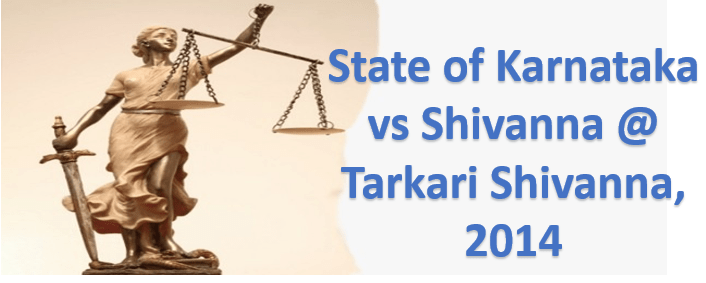
The present case is a criminal appeal in which the state of Karnataka is the petitioner and Shivanna @ Tarkari Shivanna was the respondent. The case was decided on April 25, 2014, by the two-judge bench comprising of Hon’ble Mrs. Gyan Sudha Misra and Hon’ble Mr. Justice V. Gopala Gowda. In this case, the Hon’ble Supreme Court gave important directions for the police officers for investigating the case of rape and gang rape. The apex court also mentions that there is utmost need to amend a few provisions of the Code of Criminal Procedure, 1973 so that speedy procedure for such heinous cases of rape can prevail.
Facts
The facts of the case are as follows the respondent was a resident of the Mandya district in Karnataka and was looking for work in Albur village. The respondent was denied employment by the victim’s grandfather due to the non-availability of the job. The victim, a six-year-old girl at the time of the offense, resides in Albur village.
On 17 March 2003, the victim was playing with her sister and the respondent came and took her by saying that he would give biscuits to her. Then he raped her and left near the house of her grandfather. The victim then was taken to a government hospital at Nonavinakere & later she was taken to a government hospital at Tiptur.
Law Point
- Section 376(2)(f) of Indian Penal Code,1860
The above section prescribes that whoever being a relative, guardian or teacher of, or a person in a position of trust or authority towards the woman, commits rape on such woman shall be punished with rigorous imprisonment.
- Section 164 of the Code of Criminal Procedure,1973(CrPC)
This section prescribes rules regarding the recording of confessions and statements.
- Section 161 of CrPC
The examination of witnesses shall be done with respect to the provisions of section 161.
- Section 313 of CrPC
The section empowers the court to examine the accused at any stage without any prior notice.
- Section 173 of CrPC
This section provides rules for the police officer regarding the report on completion of the investigation.
Issues
Whether the procedure of admission of statements and confessions appropriate under Section 164 of the Code of Criminal Procedure, 1973?
Judgment
On 18 March 2003, the respondent was arrested and the Trial Court convicted the accused for the offence punishable under section 376(2)(f) of the Indian Penal Code, 1860, and give life imprisonment to the accused.
Aggrieved by the decision of trial court the accused appealed in the High Court of Karnataka. The high court found the conviction to be sound and proper, but reduced the sentence of the convict from life imprisonment to 10 years and also levied a fine of Rs. 50,000
After the decision of the High Court, a special leave petition was filed in the Honourable Supreme Court by the State of Karnataka where the Court proposed to consider the matter on a merit basis. The Hon’ble Court while delivering the judgment gave importance to speedy trial in criminal cases especially in cases of rape. The apex court noted how there is a ‘pressing need to introduce drastic amendments into the Code of Criminal Procedure in the nature of fast track procedure for Fast Track Courts’. Although there are Fast Track Courts for the disposal of such cases, we do not yet have a fast-track procedure for dealing with rape and gang rape cases.
The court emphasized that ‘the recording of evidence of the victim and other witnesses multiple times ought to be put to an end which is the primary reason for the delay of the trial’.
The Apex Court exercising powers under Article 142 of the Constitution of India issued interim directions in the form of mandamus to all police stations across the country which are as follows: “
- Upon receipt of information relating to the commission of the offence of rape, the Investigating Officer shall make immediate steps to take the victim to any Metropolitan/preferably Judicial Magistrate for the purpose of recording her statement Under Section 164 Code of Criminal Procedure and a copy of the statement should be handed over to the Investigating Officer immediately with a specific direction that the contents of such statement should not be disclosed to any person till charge sheet/report is filed.
- The Investigating Officer shall take the victim to the nearest Lady Metropolitan/preferably Lady Judicial Magistrate as soon as possible.
- The Investigating Officer shall record specifically the date and the time at which he learned about the commission of the offence of rape and the date and time at which he took the victim to the Metropolitan/preferably Lady Judicial Magistrate as aforesaid.
- If there is any delay exceeding 24 hours in taking the victim to the Magistrate, the Investigating Officer should record the reasons for the same in the case diary and hand over a copy of the same to the Magistrate.
- Medical Examination of the victim: Section 164A Code of Criminal Procedure imposes an obligation on the part of Investigating Officer to get the victim of the rape immediately for medical examination. A copy of the report of such medical examination should be immediately handed over to the Magistrate who records the statement of the victim Under Section 164 Code of Criminal Procedure.”
The Apex Court also directed that a copy of this order thus be circulated to all the Director Generals of Police of all the States/Commissioner of Police in Metropolitan cities/Commissioner of Police of Union Territories.
This was done to ensure speedy enforcement of the order due to the absence of necessary amendments in the Code of Criminal Procedure so that appropriate steps can be taken for fast-track justice.
written by Geasu Sharma, Amity University, Noida, IVth semester




0 Comments